 FILM
FILM In Which It Must Have Been Quite The Night We're About To Have
 Wednesday, June 12, 2013 at 12:27PM
Wednesday, June 12, 2013 at 12:27PM 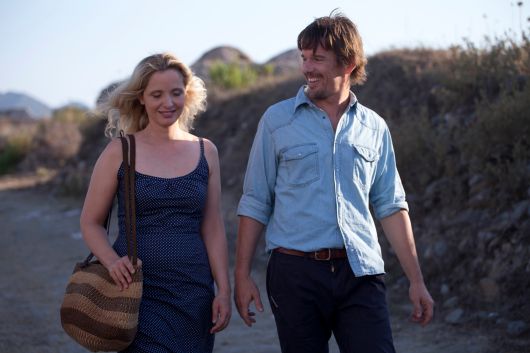
Clock Struck
by KARA VANDERBIJL
Before Midnight
dir. Richard Linklater
109 minutes
All my friends are getting married or moving in together. A friend's wedding is an incredibly high moment, not easily replicated by later life events. We forget about people after they commit collectively to kitchen utensils, as if we'd prepped their bodies for a journey into the afterlife with grave goods like KitchenAid mixers and monogrammed towels.
Those who have followed Jesse (Ethan Hawke) and Celine (Julie Delpy) since the beginning of their ambling, bantering European romance will leave the latest installment of their story, Before Midnight, with slower steps and some disappointment.
Not because Richard Linklater and his leads fail to deliver; on the contrary, this year’s film outdoes its predecessors Before Sunrise (1995) and Before Sunset (2004) in the complexity of its script, the beauty of its location, and the sincerity of its performers. The collaboration between Linklater, Hawke and Delpy feels like improv. It is in fact a carefully crafted script, replete with tiny gems of insight into the main characters, their friends and their lives.
Caught up in the dialogue, you can pick out the stories that surely trickled down from personal experience and those that were born out of imagination. Against the backdrop of the Greek isles, the film unfolds as an intimate glimpse not only into the story that we've come to love but also into the minds of those who created it.
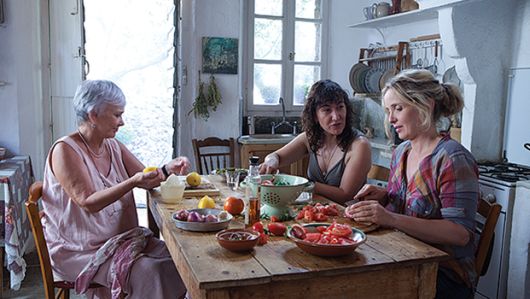
But this is hardly a film to dive headfirst into the romantic frenzy that characterized the first two chronicles of Jesse and Celine's story. Rather, it explores what happens after the fairy tale has ended. They fell in love in one Viennese night twenty years ago and rekindled their romance ten years later in a Parisian afternoon. When we left them last, Celine was singing Nina Simone over a cup of tea and Jesse was twisting his wedding band nervously, about to deliberately miss the plane back to his wife and son in Chicago, about to begin the life with Celine he's been dreaming of.
Now, nine years into whatever they began that afternoon in Paris, Jesse and Celine are nearing the end of a six-week vacation. They have seven-year-old twin daughters, who doze in the back of the car as the family drives back to their vacation home from the airport, where Jesse has just dropped off his son, Hank. It's hard for Jesse to say goodbye; they've had a good summer together, but Hank lives halfway across the world with a depressed mother and he's growing up fast.
Their farewell mirrors the one Jesse and Celine shared in Vienna, so many years ago. Granted, it's not romantic, but Jesse's desire to connect with his son obliterates the distance between them and reckons fiercely with it at the same time. The teenager answers in monosyllables as his father asks him questions about the upcoming school year and tries to set up a weekly skype date.
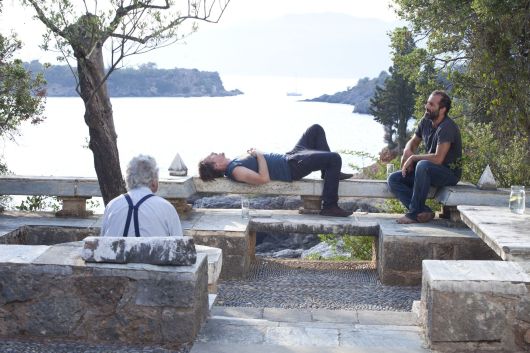
Jesse and Celine's original dilemma wouldn't exist today, and the gently ironic, numerous references to digital relationships make this very apparent. But it's also clear that genuine contact between people is difficult, or absent. As he watches his daughters play in the sea, Jesse receives a text from his father that his grandmother has died. The news is instantaneous, but the ability to be physically present in that crucial moment is impossible. And doesn't knowing something the minute it happens, yet being completely helpless in the face of it, seem like even more of an injustice?
The goodbye with Hank is the background of Jesse and Celine's first dialogue, a long, unedited shot of them sitting in the front seat. As Jesse shares his misgivings about being so far away from his son, Celine debates taking a new job in the government. Celine is worried that Jesse will ask her to move to Chicago so that they can be closer to Hank, when she already feels as if she has sacrificed so much in being his companion and a mother.
Their conversation is as lively, frank and funny as it has always been, peppered with the philosophical musings that endeared them to us so long ago. At the same time, they've been cookie-cut into a shape we've never seen them assume, although it's a shape we're familiar with. They're talking about schedules. They're talking about parenting. They're interrupted by ringing cell phones. They're struggling with the day-to-day of a seasoned relationship, one that has passed beyond its original ardor into something different.
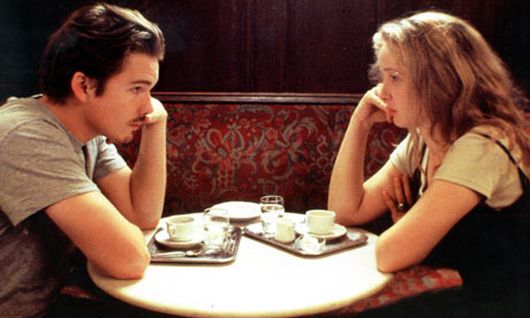
Before sunrise and sunset, it took only the two of them to create a third space in which their interaction and growing attraction for one another had space to flourish. It didn't matter if they were strolling through a park or sitting at a sidewalk cafe. Now, despite the natural beauty of the island, the reclusive vacation home and the small village tucked into the hills, the world has invaded Jesse and Ceiine's space. Their friends book a hotel room for them, complete with a bottle of wine and a couples' massage, so that they can get away together and spend a romantic evening, but they spend most of it arguing.
I think it is probably difficult to reach forty without messing up in some large way, or at least believing that you have ruined your own life even if it has gone exactly as you thought you wanted. Both Jesse and Celine are struggling with this in their own way: Jesse because he feels more and more like an estranged father, and Celine because she feels as if she has given up the best parts of herself to motherhood.
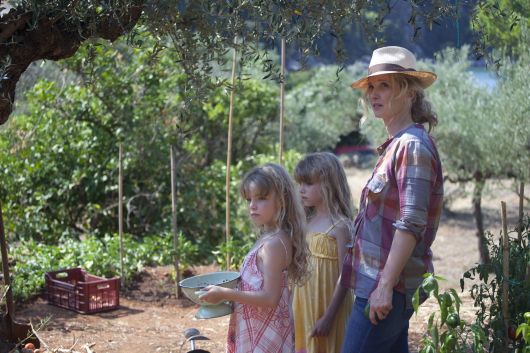
She's insecure, asking Jesse whether he'd still pick her up now, a "fat-assed middle-aged mother". She's fiery and morbid like we remember her, but she has also grown more vulnerable. Delpy parades through the hotel room bare-breasted for a good ten minutes: at first, she is Aphrodite, the lover, sharing a close moment with Jesse. As it escalates into an argument, she becomes a symbol of the indignant mother, then Liberty Leading the People, her Sorbonne post-feminist dreams fizzling into mere theory as she and Jesse tease out their very physical differences. Celine has been so many things and wants to be so many things and Delpy literally embodies them all with poise.
I wanted there to be more moments of peace in this film. I wanted there to be less shouting. More than anything, though, I wanted their fights to be about something bigger than themselves. Doesn't it blow your mind that anybody would want to be in a long-term commitment with anybody else? Is anybody immune to the fights about dishes, and laundry, and who's picking up who and who didn't wash their hair out of the sink this morning? Celine and Jesse aren't even married. Avoiding the giant clusterfuck of marriage has saved them from absolutely nothing.
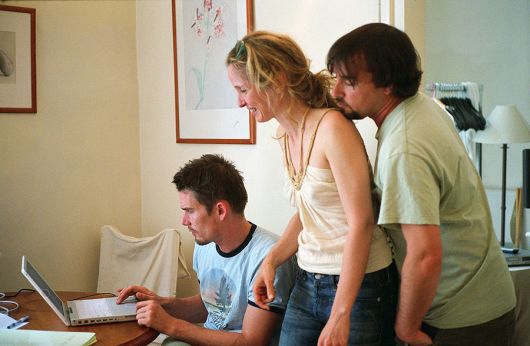 with linklaterIt would be easy to point at Before Midnight and say, "Here. Here is an example of why long-term commitments don't work. It's all roses and strolls through beautiful European cities in the beginning, but in the end, nobody knows how to make it work." I am tempted to believe this myself. We don't know how it ends. We don't know whether the couple is able to compromise. It seems like this fight, these differences, might be the end of them.
with linklaterIt would be easy to point at Before Midnight and say, "Here. Here is an example of why long-term commitments don't work. It's all roses and strolls through beautiful European cities in the beginning, but in the end, nobody knows how to make it work." I am tempted to believe this myself. We don't know how it ends. We don't know whether the couple is able to compromise. It seems like this fight, these differences, might be the end of them.
But like Before Sunrise and Before Sunset, Linklater's latest is simply a brief glimpse into a relationship. It's a fleeting moment. It might be true that you cannot sustain romantic passion forever. But it is also true that you cannot sustain rage forever. It's too hard on the heart. We are rarely privy to this part of the story, to what happens later, when we've willingly launched ourselves into the loss of our freedom that is loving another person. The daily ins and outs, disagreements, and pleasures are what our first connections, hopes and dreams move towards. This is a film about wanting the quiet moments in between the extreme highs and lows.
Like Celine said in Before Sunrise, "I believe if there's any kind of God it wouldn't be in any of us, not you or me but just in this little space in between. If there's any kind of magic in this world it must be in the attempt of understanding someone sharing something. I know, it's almost impossible to succeed but who cares really? The answer must be in the attempt."
Kara VanderBijl is the managing editor of This Recording. She is a writer living in Chicago. She last wrote in these pages about taking things for granted. She tumbls here and twitters here.
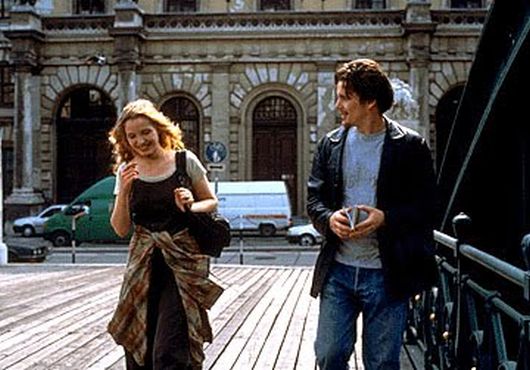
"Let Me Go On" - Matt Simons (mp3)
"I Will Follow You Into the Dark" - Matt Simons (mp3)
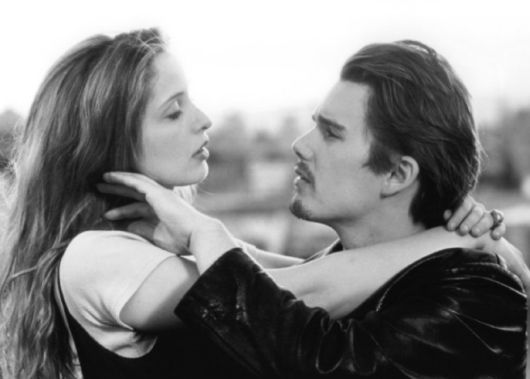
 ethan hawke,
ethan hawke,  julie delpy,
julie delpy,  kara vanderbijl
kara vanderbijl 










































